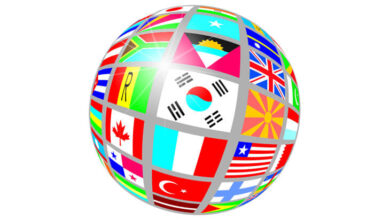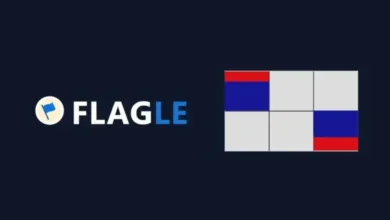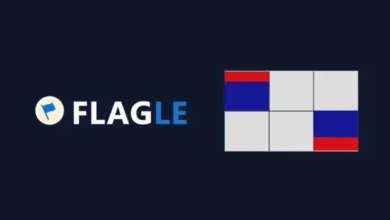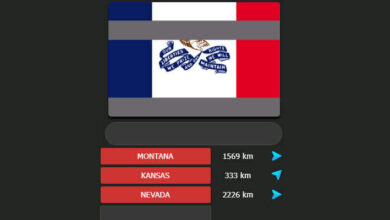The Rise of Flagle: A New Twist on Wordle and Geography

In the ever-evolving world of online games, few have captured the collective imagination as effectively as Wordle. Since its launch in October 2021, Wordle has become a cultural phenomenon, inspiring countless spin-offs and adaptations. Among these, Flagle has emerged as a unique and engaging variant that combines the addictive word-guessing mechanics of Wordle with the educational appeal of geography. In this article, we’ll explore the origins of Flagle, how it works, its educational value, and why it has become a favorite for puzzle enthusiasts and geography buffs alike.
What is Flagle?
Flagle is a web-based game that challenges players to guess the correct country based on its flag. Much like Wordle, players have a limited number of attempts to solve the puzzle, and the game provides feedback after each guess to help narrow down the correct answer. The game is simple yet addictive, offering a perfect blend of challenge and learning.
The name “Flagle” is a portmanteau of “flag” and “Wordle,” reflecting its core mechanics. While Wordle focuses on guessing a five-letter word, Flagle shifts the focus to identifying a country by its flag. This twist not only makes the game fresh and exciting but also introduces players to the fascinating world of flags and their meanings.
How to Play Flagle
Playing Flagle is straightforward, even for those who are new to Wordle-style games. Here’s a step-by-step guide to getting started:
- Access the Game: Flagle is available on various websites, often for free. Simply search for “Flagle” online, and you’ll find a platform to play.
- Start a New Game: Once you’ve accessed the game, click on “New Game” or “Play” to begin. The game will display a blank flag and a text box for your guess.
- Make Your Guess: Type in the name of the country you think the flag represents. Flagle supports a wide range of countries, so you’ll need to be familiar with flags from around the world.
- Receive Feedback: After each guess, the game will provide feedback. If your guess is incorrect, Flagle will indicate how close you are to the correct answer. This feedback might include hints about the continent, colors, or symbols on the flag.
- Narrow Down the Answer: Use the feedback to refine your guesses. For example, if the game indicates that the correct flag is from Europe, you can focus on European countries for your next guess.
- Solve the Puzzle: Continue guessing until you correctly identify the country or run out of attempts. Most versions of Flagle allow six guesses, similar to Wordle.
Why Flagle is So Addictive
Flagle’s appeal lies in its simplicity, challenge, and educational value. Here are some reasons why players keep coming back for more:
- Short and Sweet: Like Wordle, Flagle is designed to be played in just a few minutes. This makes it perfect for a quick mental workout during a break or commute.
- Educational Fun: Flagle isn’t just a game; it’s a learning tool. Players naturally improve their knowledge of world flags and geography as they play.
- Global Appeal: Flags are universal symbols, and Flagle’s focus on countries from around the world makes it accessible and interesting to a global audience.
- Satisfying Challenge: The limited number of guesses adds a layer of strategy and tension, making each correct answer feel like a triumph.
- Community and Competition: Many players enjoy sharing their results on social media, sparking friendly competition and discussions about flags and geography.
The Educational Value of Flagle
One of the most significant benefits of Flagle is its educational potential. In a world where geography literacy is often lacking, games like Flagle provide a fun and engaging way to learn. Here’s how Flagle contributes to education:
- Flag Recognition: Players become familiar with the flags of different countries, including their colors, symbols, and patterns.
- Geographical Knowledge: By associating flags with countries, players learn about the location, culture, and history of nations around the world.
- Critical Thinking: Flagle encourages players to analyze clues and make logical deductions, sharpening their problem-solving skills.
- Cultural Awareness: Flags often reflect a country’s history, values, and identity. Learning about flags can foster a deeper appreciation for global diversity.
- Memory Improvement: Repeated exposure to flags and country names helps reinforce memory and recall.
The Origins of Flagle
Flagle is part of a broader trend of Wordle-inspired games that have emerged in the wake of Wordle’s success. These spin-offs take the core mechanics of Wordle and apply them to different themes, such as math (Nerdle), music (Heardle), and even Taylor Swift (Swiftle). Flagle stands out by focusing on geography, a subject that resonates with people of all ages and backgrounds.
The exact origins of Flagle are unclear, as multiple developers have created their own versions of the game. However, its popularity can be attributed to the universal appeal of flags and the growing interest in geography-based games. Flagle’s success also reflects the broader trend of gamification, where educational content is presented in a game format to make learning more engaging.
Tips for Mastering Flagle
If you’re new to Flagle or looking to improve your skills, here are some tips to help you succeed:
- Learn the Basics: Familiarize yourself with the flags of major countries, as these are more likely to appear in the game.
- Pay Attention to Colors: The colors of a flag can provide important clues about the country. For example, many African flags feature green, yellow, and red, while Scandinavian flags often include a cross design.
- Study Symbols: Flags often include symbols that represent a country’s history, culture, or values. For example, the maple leaf on Canada’s flag or the crescent moon on Pakistan’s flag.
- Use Process of Elimination: If you’re unsure about a flag, use the feedback from previous guesses to narrow down the possibilities.
- Practice Regularly: The more you play Flagle, the better you’ll become at recognizing flags and making educated guesses.
The Future of Flagle
As Flagle continues to grow in popularity, it’s likely that we’ll see new features and variations of the game. Some potential developments include:
- Expanded Databases: Future versions of Flagle could include flags of states, provinces, or even historical flags.
- Multiplayer Mode: Adding a multiplayer option would allow players to compete against friends or strangers in real-time.
- Educational Resources: Integrating links to educational content about countries and their flags could enhance the game’s learning potential.
- Customization Options: Players might be able to customize their experience by selecting specific regions or difficulty levels.
- Mobile Apps: While Flagle is currently web-based, a dedicated mobile app could make the game even more accessible.
Flagle and the Gamification of Learning
Flagle is a prime example of how games can be used to make learning fun and engaging. By combining the challenge of a puzzle with the educational content of geography, Flagle taps into the power of gamification. This approach has been shown to increase motivation, retention, and enjoyment, making it an effective tool for education.
In a world where screen time is often criticized for its negative effects, games like Flagle offer a positive alternative. They provide a way to learn and grow while having fun, proving that education and entertainment don’t have to be mutually exclusive.
Conclusion
Flagle is more than just a game; it’s a celebration of the world’s diversity and a testament to the power of gamification. By combining the addictive mechanics of Wordle with the educational appeal of geography, Flagle has carved out a unique niche in the world of online games. Whether you’re a seasoned puzzle enthusiast or a curious learner, Flagle offers a fun and rewarding way to explore the world, one flag at a time. So why not give it a try? You might just discover a new passion for flags and geography along the way.




